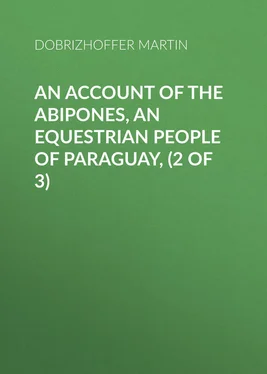Martin Dobrizhoffer - An Account of the Abipones, an Equestrian People of Paraguay, (2 of 3)
Здесь есть возможность читать онлайн «Martin Dobrizhoffer - An Account of the Abipones, an Equestrian People of Paraguay, (2 of 3)» — ознакомительный отрывок электронной книги совершенно бесплатно, а после прочтения отрывка купить полную версию. В некоторых случаях можно слушать аудио, скачать через торрент в формате fb2 и присутствует краткое содержание. Жанр: foreign_antique, foreign_prose, на английском языке. Описание произведения, (предисловие) а так же отзывы посетителей доступны на портале библиотеки ЛибКат.
- Название:An Account of the Abipones, an Equestrian People of Paraguay, (2 of 3)
- Автор:
- Жанр:
- Год:неизвестен
- ISBN:нет данных
- Рейтинг книги:3 / 5. Голосов: 1
-
Избранное:Добавить в избранное
- Отзывы:
-
Ваша оценка:
- 60
- 1
- 2
- 3
- 4
- 5
An Account of the Abipones, an Equestrian People of Paraguay, (2 of 3): краткое содержание, описание и аннотация
Предлагаем к чтению аннотацию, описание, краткое содержание или предисловие (зависит от того, что написал сам автор книги «An Account of the Abipones, an Equestrian People of Paraguay, (2 of 3)»). Если вы не нашли необходимую информацию о книге — напишите в комментариях, мы постараемся отыскать её.
An Account of the Abipones, an Equestrian People of Paraguay, (2 of 3) — читать онлайн ознакомительный отрывок
Ниже представлен текст книги, разбитый по страницам. Система сохранения места последней прочитанной страницы, позволяет с удобством читать онлайн бесплатно книгу «An Account of the Abipones, an Equestrian People of Paraguay, (2 of 3)», без необходимости каждый раз заново искать на чём Вы остановились. Поставьте закладку, и сможете в любой момент перейти на страницу, на которой закончили чтение.
Интервал:
Закладка:
I have often wondered that the savage Aucas, Puelches or Patagonians, and other inhabitants of the Magellanic region, who dwell nearer to the South Pole, should be darker than the Abipones, Mocobios, Tobas, and other tribes, who live in Chaco, about ten degrees farther north, and consequently suffer more from the heat. May not the difference of food have some effect upon the complexion? The Southern savages feed principally upon the flesh of emus and horses, in which the plains abound. Does this contribute nothing to render their skin dark? What, if we say that the whiteness of the skin is destroyed by very severe cold, as well as by extreme heat? Yet if this be the case, why are the inhabitants of Terra del Fuego more than moderately white: for that island is situated in the fifty-fifth degree of latitude, at the very extremity of South America, hard by the Antarctic Pole? May we not suppose that these Southern nations derive their origin from Africa, and brought the dark colour of the Africans into America? If any one incline to this opinion, let him consider by what means they crossed the immense sea which separates Africa from America, without the use of the magnet.
Many have written, and most persons at this day believe the Patagonians to be giants, perhaps the progeny of the Cyclops Polyphemus; but believe me when I say that the first are deceivers, and the latter their dupes. In the narrative of the voyage of the Dutch commander, Oliver Von Nord, who, in the year 1598, passed the Straits of Magellan, the Patagonians are asserted to be ten or eleven feet high. The English, who passed these straits in 1764, gave them eight feet of height. The good men must have looked at those savages through a magnifying-glass, or measured them with a pole. For in the year 1766, Captains Wallis and Carteret measured the Patagonians, and declared them to be only six feet, or six feet six inches high. They were again measured in 1764, by the famous Bourgainville, who found them to be of the same height as Wallis had done. Father Thomas Falconer, many years Missionary in the Magellanic region, laughs at the idea entertained by Europeans of the gigantic stature of the Patagonians, instancing Kangapol chief Cacique of that land, who exceeded all the other Patagonians in stature, and yet did not appear to him to be above seven feet high. Soon after my arrival, I saw a great number of these savages in the city of Buenos-Ayres. I did not, indeed, measure them, but spoke to some of them by an interpreter, and though most of them were remarkably tall, yet they by no means deserved the name of giants.
CHAPTER III.
OF THE PERSONS OF THE ABIPONES, AND THE CONFORMATION OF THEIR BODIES
The Abipones are well formed, and have handsome faces, much like those of Europeans, except in point of colour, which, though not entirely white, has nothing of the blackness of Negroes and Mulattoes. For that natural whiteness which they have in infancy is somewhat destroyed as they grow up, by the sun, and by the smoke: as nearly the whole of their lives is passed in riding about plains exposed to the beams of the sun, and the short time that they spend in their tents, they keep up a fire on the ground day and night, by the heat and smoke of which they are unavoidably somewhat darkened. Whenever the cold south wind blows, they move the fire to the bed, or place it underneath the hanging net in which they lie, and are thus gradually smoke-dried, like a gammon of bacon in a chimney. The women, when they ride out into the country, shield their faces from the sun's rays with an umbrella, and are, in consequence, generally fairer than the men, who, more ambitious to be dreaded by their enemies than to be loved, to terrify than attract beholders, think the more they are scarred and sun-burnt, the handsomer they are.
I observed that almost all the Abipones had black but rather small eyes; yet they see more acutely with them, than we do with our larger ones; being able clearly to distinguish such minute, or distant objects as would escape the eye of the most quick-sighted European. Frequently, in travelling, when we saw some animal running at a distance, and were unable to distinguish what it was, an Abipon would declare, without hesitation, whether it was a horse or a mule, and whether the colour was black, white, or grey; and on examining the object more closely, we always found him correct.
Moreover, in symmetry of shape, the Abipones yield to no other nation of America. I scarce remember to have seen one of them with a nose like what we see in the generality of Negroes, flat, crooked, turned up towards the forehead, or broader than it should be. The commonest shape is aquiline; as long and sharp as is consistent with beauty. An hundred deformities and blemishes, common among Europeans, are foreign to them. You never see an Abipon with a hump on his back, a wen, a hare lip, a monstrous belly, bandy legs, club feet, or an impediment in his speech. They have white teeth, almost all of which they generally carry to the grave quite sound. Paraguay sometimes produces dwarf horses, but never a dwarf Abipon, or any other Indian. Certain it is, that out of so many thousands of Indians, I never saw an individual of that description. Almost all the Abipones are so tall, that they might be enlisted amongst the Austrian musketeers.
The Abipones, as I told you before, are destitute of beard, and have perfectly smooth chins like all the other Indians, both of whose parents are Americans. If you see an Indian with a little beard, you may conclude, without hesitation, that one of his parents, or at any rate his grandfather, must have been of European extraction. I do not deny that a kind of down grows on the chins of the Americans, just as in sandy sterile fields, a straggling ear of corn is seen here and there; but even this they pull up by the roots whenever it grows. The office of barber is performed by an old woman, who sits on the ground by the fire, takes the head of the Abipon into her lap, sprinkles and rubs his face plentifully with hot ashes, which serve instead of soap, and then, with a pair of elastic horn tweezers, carefully plucks up all the hairs; which operation the savages declare to be devoid of pain, and that I might give the more credit to his words, one of them, applying a forceps to my chin, wanted to give me palpable demonstration of the truth. It was with difficulty that I extricated myself from the hands of the unlucky shaver, choosing rather to believe than groan.
The Abipones bear the pain inflicted by the old woman with the forceps, without complaining, that their faces may be smooth and clear; for they cannot endure them to be rough and hairy. For this reason, neither sex will suffer the hairs, with which our eyes are naturally fortified, but have their eye-brows and eye-lashes continually plucked up. This nakedness of the eyes, though it disfigures the handsomest face in a high degree, they deem indispensable to beauty. They ridicule and despise the Europeans for the thick brows which overshadow their eyes, and call them brothers to the ostriches, who have very thick eye-brows. They imagine that the sight of the eye is deadened, and shaded by the adjacent hairs. Whenever they go out to seek honey, and return empty-handed, their constant excuse is, that their eye-brows and eye-lashes have grown, and prevented them from seeing the bees which conduct them to the hives. From the beard, let us proceed to the hair of the head.
Читать дальшеИнтервал:
Закладка:
Похожие книги на «An Account of the Abipones, an Equestrian People of Paraguay, (2 of 3)»
Представляем Вашему вниманию похожие книги на «An Account of the Abipones, an Equestrian People of Paraguay, (2 of 3)» списком для выбора. Мы отобрали схожую по названию и смыслу литературу в надежде предоставить читателям больше вариантов отыскать новые, интересные, ещё непрочитанные произведения.
Обсуждение, отзывы о книге «An Account of the Abipones, an Equestrian People of Paraguay, (2 of 3)» и просто собственные мнения читателей. Оставьте ваши комментарии, напишите, что Вы думаете о произведении, его смысле или главных героях. Укажите что конкретно понравилось, а что нет, и почему Вы так считаете.












